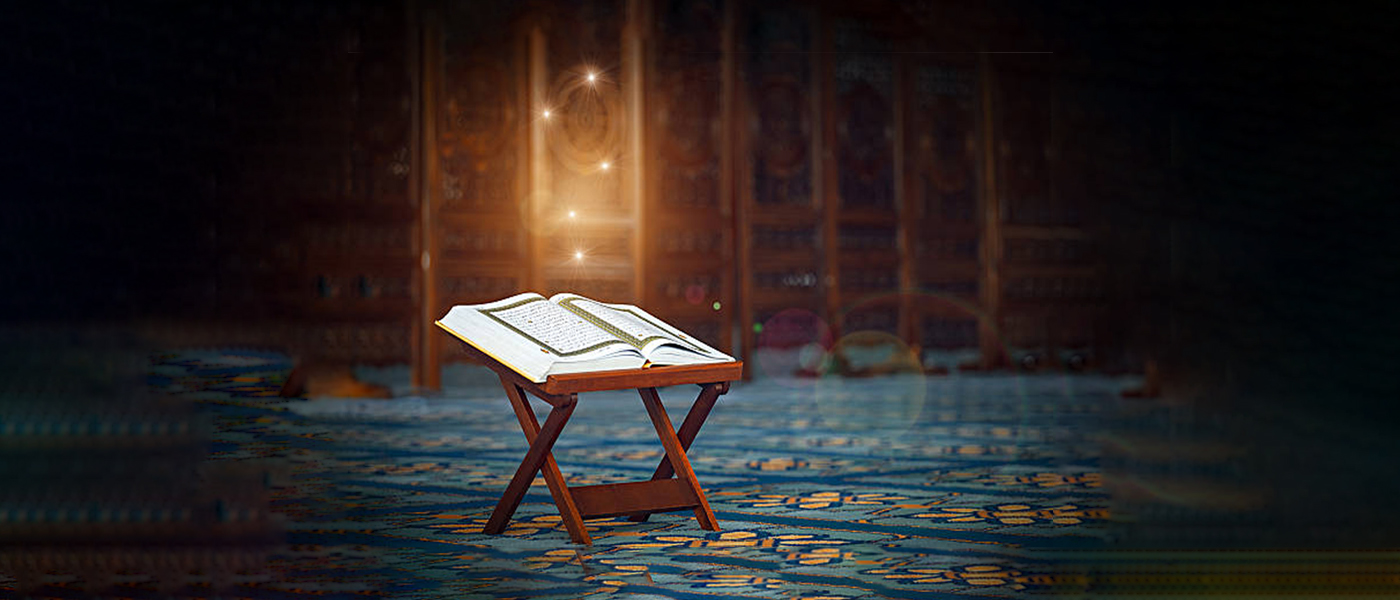

The Unity of All Monotheistic Faiths
The plurality of different religions is undoubtedly one of the most important issues that concern people who are interested in religious studies today. Some of the questions they may ask include:
- Which religion is right?
- What do they have in common?
- How should the followers of different faiths behave when faced with the followers of other religions?
- Will all religions lead to eternal salvation?
In this article, we will see how Islam regards other religions and more specifically how it deals with the questions above.
All Divine faiths lead to the same God
According to the Islamic viewpoint, all Divine religions have been sent to connect human beings to their Gracious Creator, the only one God. Quran says:
“O People of the Book! Come to a common word between us and you: that we will worship no one but Allah, that we will not ascribe any partner to Him, and that some of us will not take some others as lords besides Allah…” (3:64)
As per this verse, Islam holds that all the other Divine religions root in Monotheism. The idea of God is actually so clear in these monotheistic faiths that some religious studies scholars regard it as an essential requirement for them to be included in the category of religions; in other words, those faiths that have no belief in God or practices of worship cannot be called religion at all.
Moreover, though the followers of some other faiths may worship different gods, all the Abrahamic religions assert the unity of God, and that He is the only Creator. This has been mentioned in the holy Quran many times:
“We did not send any apostle before you but that We revealed to him that ‘There is no god except Me; so worship Me.’” (21:25)
The belief in One God is somehow evident in the other religions as well; lots of them admit the fact that they feel there is some being which created the world and life and influences it to some extent. Quran says:
“If you ask them, ‘Who created the heavens and the earth, and who has disposed the sun and the moon?’ They will surely say, ‘Allah.’” (29:61)
This has also been asserted in the verses of Bible and Torah:
“I am the LORD your God, who brought you out of the land of Egypt, out of the house of slavery. "You shall have no other gods before Me. "You shall not make for yourself an idol, or any likeness of what is in heaven above or on the earth beneath or in the water under the earth.…” (Exodus 20:3) [1].
Islam Has Completed the Previous Religions
Contrary to popular belief, the religion of Islam does not deny the truth of the previous monotheistic religions, rather the religion of God was perfected in Islam through the revelation that was sent to the last messenger of God, Prophet Muhammad (PBUH):
“We have sent down to you the Book with the truth, confirming what was before it of the Book and as a guardian over it…” (5:48)
In fact, Islam has been revealed to purify the previous faiths from distortions and to complete their teachings:
“Today I have perfected your religion for you, and I have completed My blessing upon you, and I have approved Islam as your religion…” (5:3)
The advent of Prophet Muhammad (PBUH&HP) with his true religion was also predicted in the Bible:
“When the Spirit of truth comes, He will guide you into all truth. For He will not speak on His own, but He will speak what He hears, and He will declare to you what is to come” (John, 16:13) [2].
Muslims Respect the Followers of the Previous Monotheistic Faiths
Also, Islamic teachings and the holy Quran always emphasize the significance of respecting the freedom and other rights of the followers of the previous religions; Muslims, accordingly, hold the followers of those religions in high regard:
“Do not argue with the People of the Book [the followers of the previous monotheistic faiths] except in a manner which is best, except such of them as are wrongdoers, and say, ‘We believe in what has been sent down to us and in what has been sent down to you; our God and your God is one [and the same], and to Him do we submit.’” (29:46)
In Islam “There is no compulsion in religion” (2:256), and even if one chooses to follow another monotheistic faith other than Islam, he/she has every right to live in peace among Muslims as an honored citizen with all rights and privileges [3].
Islam Is a General Title for All the Prophets’ Call
“So set your heart as a person of pure faith on this religion, the original nature endowed by Allah according to which He originated mankind…” (30:30)
Muslims believe that the innate religion is something both Muslims and non-Muslims possess by birth; this original religion is what Muslims define as Islam. They also hold that the differences between various religions are due to particular requirements and potentials of societies during the various periods of prophecy:
“We did not send any apostle except with the language of his people so that he might make [Our messages] clear to them.” (14:4)
Consequently, the calls of the prophets were alike since all their invitations originated from a single source and followed a unified line of faith with a single aim, i.e., submission to the Lord of the worlds, which is the real meaning of Islam:
“Indeed, with Allah religion is Islam” (3:19)
In fact, Islam, i.e., submission to Allah is the cornerstone of all religions.
So, Muslims testify to the truth of all God’s Messengers and that they have all agreed with each other, each of them testifying to the truth of the words of the preceding Prophets (AS) and giving the tidings of the Divine appointment of the next Messenger:
“Say, ‘We have faith in Allah and what has been sent down to us, and what was sent down to Abraham, Ishmael, Isaac, Jacob and the Tribes, and that which Moses and Jesus were given, and that which the prophets were given by their Lord; we make no distinction between any of them and to Him do we submit’” (2:136).
Indeed, with Allah religion is Islam [4]
Islam is a religion for all human beings of all time:
“We did not send you [Muhammad] but as a mercy to all the nations” (21:107)
This verse clearly indicates the universality of the message brought by Prophet Muhammad (PBUH&HP).
Although the holy Quran regards belief in the prophets a major basis of a Muslim’s ideology, it maintains that what was revealed to the last Prophet, Muhammad (PBUH&HP), was the most advanced program and the perfect law of the divine religion:
“It is He who has sent His Apostle with guidance and the true religion that He may make it prevail over all religions though the polytheists should be averse” (61:9).
Accordingly, it will not be accepted by Allah to remain on the previous incomplete paths after the revelation of the Holy Quran:
“Should anyone follow a religion other than Islam, it shall never be accepted from him, and he will be among the losers in the Hereafter” (3:85).
There Will Be No Fear for the True Followers of Other Faiths
The verse above does not, however, mean that the followers of other faiths will be all losers. Quite the opposite! There are believers who have not had a chance to reach the completed and updated truth, or those who are exposed to intense propaganda against Islam and think it is impossible that such a religion (distorted image of Islam) might be the right way to salvation, or even those Christians, Jews or any other believers who have searched enough and have been convinced, based on reasons, that their beliefs are right (even if their reasons seem invalid and wrong in the eyes of Muslims); what do you think Quran says about them?
“Indeed, the faithful, the Jews, the Christians and the Sabaeans—those of them who have faith in Allah and the Last Day and act righteously—they shall have their reward from their Lord, and they will have no fear, nor will they grieve” (2:62).
Finally, going through the Quranic verses about religions and their messages, we may conclude that Islam encompasses all the other divine revelations; the ones that have been distorted throughout history, or simply do not sufficiently meet people’s needs any longer; Islam is, in fact, the final, authentic, complete, and updated message of God that draws a perfect picture of man and the base for his reformation that will ultimately lead to his salvation.
References:
- Exodus 20:3
- John 16:13
- monptheisim
- Quran 3:19
- monotheistic faith
Share This Article

The true place of intellection in our lives
Have you ever thought about which among the thousands of blessings Allah granted us is the most significant? It is not an easy task, but if you carefully think about it, you may guess the answer.
As our dear Prophet (PBUH&HP) said (1), the greatest blessing is intellect. Through this remarkable gift, humans have been recognized as the pinnacle of all creations, even angels bow ed down to him expect for Satan. Let us even think about this matter rationally, setting aside religious teachings . Throughout history, the inherent power of humans against wild animals has not primarily been their physical strength or survival capabilities in harsh natural conditions.
Instead, it's their intellect that empowers them to create weapons and shelter, making them the most resilient species on Earth.
Our great Prophet and dear Imams (PBU Them) have consistently mentioned that intellect is one of humanity’s paramount gifts that must be integrated into our lives. Even the Holy Quran has numerous verses about intellect and wisdom, beautifully highlighting their profound importance. If you read the Holy Quran frequently, you have likely seen the words like “They are reasoned” or “They are contemplating” in many verses. These instances underscore how dearly Islam values intellect and stresses its role in our lives. Let’s now explore some verses here that show us the significance of intellect:
[This is] a blessed Book that We have sent down to you, so that they may contemplate its signs, and that those who possess intellect may take admonition.
(The Holy Quran 38:29)
They ask you concerning wine and gambling. Say, ‘There is a great sin in both of them, and some profits for the people, but their sinfulness outweighs their profit.’ And they ask you as to what they should spend. Say, ‘All that is surplus.’ Thus does Allah clarify His signs for you so that you may reflect
(The Holy Quran 2:219)
Indeed, We have sent it down as an Arabic Quran so that you might understand . (The Holy Quran 12:2)
Is he who supplicates in the watches of the night, prostrating and standing, apprehensive of the Hereafter and expecting the mercy of his Lord...? Say, ‘Are those who know equal to those who do not know?’ Only those who possess intellect take admonition.
(The Holy Quran 39:9)
The Prophet (PBUH&HP) stated “The good of this world and the hereafter lies in knowledge, and the evil of this world and the hereafter lies in ignorance.” (2)
Imam Sadigh (AS) said “I wish to see none of you [Shias] but in two categories: a scholar or a student.” (3)
Imam Ali (AS)proclaimed “Indeed, knowledge is the lifeblood of hearts, enlightening blinded eyes and empowering incapacitated bodies.” (4)
References:
- Allah (SW) has not created anything better for man than reason .
- Bihar al-Anwar (79th Volume – page 170)
- Al-Amali Tousi (Page 303)
- Tuhaf al-Uqul (page 28)
Read More

12 Scientific Facts in The Quran Discovered Centuries Later: Part 2
In the first part of this article on the scientific facts in the Quran, some astronomical facts mentioned were discussed. Here, we review some interesting facts about nature, including some points about mountains, the origin of life, the position of the sky and the seas merging together.
5. Mountains with Deep Roots under the Ground
The Quran has used the word stakes to describe mountains: “It is He who has spread out the earth and set in it firm mountains” (13:3), “Did We not make the earth a resting place? and the mountains stakes?” (78:6-7). It means that mountains have deep roots under the ground surface. Mountains do have deep roots, and the word stakes is an accurate description for them. This fact was discovered only in the latter half of the 19th century. The presence of the mountains on the ground also helps to stabilize the crust of the earth [4]. They also hinder the earth-shaking. “He cast in the earth firm mountains lest it should shake with you” (16:15). This is known today under the theory of plate tectonics since the late 1960s [1].
6. The Origin of Life according to the Quran
Life of a human being starts in water. From conception to birth, a fetus is protected and cushioned in a sack of water. A human body needs water in all its cells, organs, and tissues to help regulate its temperature and maintain other bodily functions. Plants also need enough hydration to perform photosynthesis, while animals consume water to carry out cell activity. Overall, water is an essential element for all living beings on earth. This fact was discovered only after the invention of the microscope. Now we know that all living things are made up of cells which are mostly made up of water. This fact has already been stated in the Quran: “We made every living thing out of water? Will they not then have faith?” (21:30).
7. The Sky as the Protector of the Earth
The sky plays several essential roles as the protector of the earth, such as filtering out the lethal rays of the sun. If there were no sky, the sun’s radiations would have killed off all life on earth. The sky also acts as a blanket around the earth, which protects the living things from freezing out by the cold just above the sky that is approximately -270°C. The greenhouse effect is another role that the sky plays. By warming the surface of the earth by means of heat retention, the sky reduces temperature extremes between day and night [2]. These protective roles of the sky were discovered by scientists in the 20th century. The Quran has mentioned this role of the sky as: “We made the sky a preserved roof and yet they are disregardful of its signs.” (21:32).
8. Where the Seas Meet
It has been discovered by the scientists that there is a barrier between the two different seas that meet. Hence, each of the seas has its own temperature, salinity, and density, like the Mediterranean Sea and Atlantic Ocean water. Despite large waves, strong currents, and tides in these seas, they neither mix nor do they transgress this barrier [3]. This phenomenon has been mentioned in the Quran as: “He merged the two seas, meeting each other. There is a barrier between them which they do not overstep.” (55:19-20). There is also a case where fresh (sweet) and saltwater meet. Here, the Quran talks about the existence of a forbidding partition along with the barrier: “It is He who merged the two seas: this one sweet and agreeable, and that one briny and bitter, and between the two He set a barrier and a forbidding hindrance.” (25:53). Modern science has discovered that in estuaries, where fresh and saltwater meet, there is a marked density discontinuity that separates the two layers. The salinity of this zone of separation (partition) is different from that of freshwater and that of saltwater. There is, therefore, the division of water in estuaries into three parts: freshwater, saltwater, and the partition [3].
Follow us on the last part of this topic to find out what the Quran has revealed about human embryonic development, clouds, and deep seas, and the creation of everything in pairs.
References:
Read More

